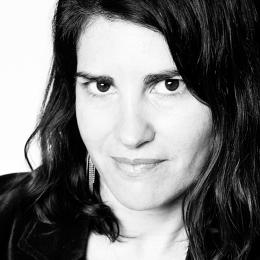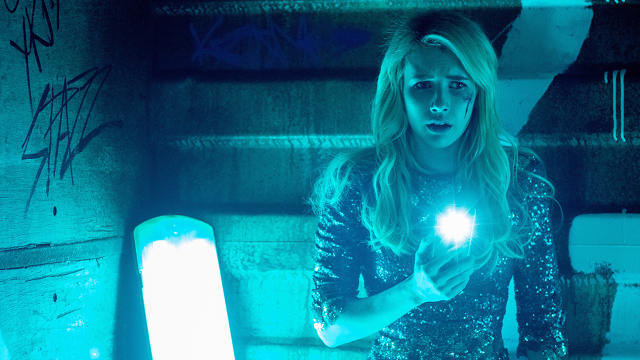Seeking Creative Enlightenment? “Nerve” Writer Jessica Sharzer Says “Never Be Boring”
“Never be boring.” Cogent, if not a little vague, advice straight from TV titan Ryan Murphy to screenwriter Jessica Sharzer.
Sharzer, who was a writer on American Horror Story for four seasons, has grafted Murphy’s mantra onto every project since, resulting in an exercise of creative balance by propelling character development and kinetic storytelling in equal measure.

“What distinguishes his shows from a lot of other stuff on TV is he’ll never do a scene if he thinks it’s just exposition—ever,” Sharzer says. “It always has to be interesting on its own terms. The ‘never be boring’ rule applies to any genre you’re writing.”
After bouncing from studying Russian literature at Berkeley to film school at NYU to hustling as a writer-director hyphenate in L.A., Sharzer’s big break—and even bigger learning curve—came when she landed in the writers’ room for season one of American Horror Story.
“It was absolutely a flashpoint—we had the best of the best in the business, and I was spoiled by it because most TV shows don’t have Jessica Lange, Kathy Bates, Angela Bassett, James Cromwell, and Sarah Paulson. I had a very rarified experience coming into TV through that show,” Sharzer says. “It was an incredible learning curve because I was surrounded by much better writers, and I was challenged by them on a daily basis.”

Part of Sharzer’s education was being open to collaboration. Before American Horror Story, Sharzer was largely in her head, writing and directing her own projects like 2004’s indie drama Speak, starring Kristen Stewart. Being a relatively smaller cog in the creative process forced Sharzer to pinpoint her weaknesses and allow her ideas to be tractable.
“When you’re part of a larger machine, you have to figure out what your value is to that team and be humble about the things you’re not as strong at,” Sharzer says. “There were people in our room who were better at writing action or better at writing the love scenes or better at writing horror. So we would be collective about our approach to the writing. There wasn’t a lot of ego about my script, your script—my episode, your episode. It was really our show and we all felt equally invested in every episode.”
Consider Murphy’s rule for perpetual thrills and lessons in creative think-tanking Sharzer’s training for her most recent script: the adaptation of Jeanne Ryan’s young-adult novel Nerve.
Sick of being the mousy wallflower, high school senior Vee (Emma Roberts) signs up to play Nerve, an anonymous online game where “watchers” pay money to give dares to the “players”—the higher the stakes, the bigger the payout. When Vee teams up with Ian (Dave Franco), the two plummet from cutesy challenges into the nether regions of the game with no easy way out.
For anyone familiar with Nerve the novel, this is your official warning that Sharzer’s version has a much darker coat. Part of the challenge for Sharzer and the director duo Ariel Schulman and Henry Joost was to substantially dial up the danger of the dares in Nerve to give the story more of an edge but keep it all in the PG-13 realm to reach its target audience.
“The book tended to skew more tween and we wanted a movie that was going to really hit the audience that is most vulnerable to social media and the dangers of it. We definitely didn’t want an R rating, but we did want to have a movie that was tough and scary and cinematic and sexy,” Sharzer says. “[Schulman and Joost] did a great job of capturing a real moment in history when teenagers are negotiating their relationships and their lives through social media. What they have access to is amazing in terms of global communication, but at the same time there are certain risks some of which are insidious and invisible—those are the ones we wanted to expose through the movie without being preachy. We wanted to keep it entertaining so that the message was not a telegram that was emblazoned on the movie. We wanted the net balance to be ‘beware’—be careful of what you put on the Internet, be careful of what information you give other people.”

The dares that made the cut in the film version of Nerve are adequately intense: racing blindfolded down a New York City street on a motorcycle, crossing a horizontal ladder tens of stories high, hanging one-handed from a crane on a skyscraper, etc. However, Sharzer admits her original intentions were way more sinister.
“Our original concept was to do a thriller in the vein of The Game by David Fincher, and so our first passes at the script were much darker and scarier. For example, I had Vee doing a drug deal and getting arrested and being booked, so she has a permanent record. I wanted the stakes to be high enough that kids really would think twice about it,” Sharzer says. “But that felt really harsh to give our main character that big of a spanking through the movie.”
Sharzer also nixed a gnarly sex dare given to Vee’s more adventurous friend Sydney.

“We had Sydney submitting to basically a prostitution dare. She doesn’t go through with it even in the drafts of the script that we wrote, but she was contemplating it,” Sharzer says. “I don’t think the movie really suffers for it. I would say that the movie strikes a balance between the fantasy of the first half and the nightmare of the second half.”
In a film like Nerve, it’s easy for the action of something like death-defying dares to overtake the characters at the center of the story. One of the scenes that was rewritten the most had nothing to do with scaling buildings or laying on a railroad track. It was an argument between Sydney and Vee that shifts the dynamic of their friendship. But there are times when a story arc has to flatline for the sake of the collective vision. In Sharzer’s original drafts, there was a deeper depiction of Vee’s relationship with her single mother (Juliette Lewis). Even though it struck a personal note for Sharzer who’s a mother as well, she knew well enough that the “never be boring” rule plus not being in the director’s chair would equal some deep cuts.
“There are a lot of scenes I miss that fell out along the way, but you want to keep the movie moving forward, and [Schulman and Joost] had such a pace to it that was so exciting that the mother-daughter [storyline] probably started to feel slow by comparison to the rest of the movie,” Sharzer says. “In TV, the writer is king; and with movies, the director is king. Once the script gets turned in to the director, it’s their movie, so the writer really has to let go. But if they’re good directors, they’ll bring something to the material that you never saw.”
Fast Company , Read Full Story
(32)













